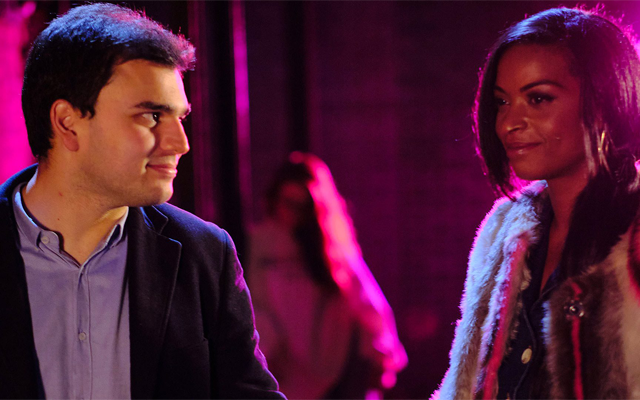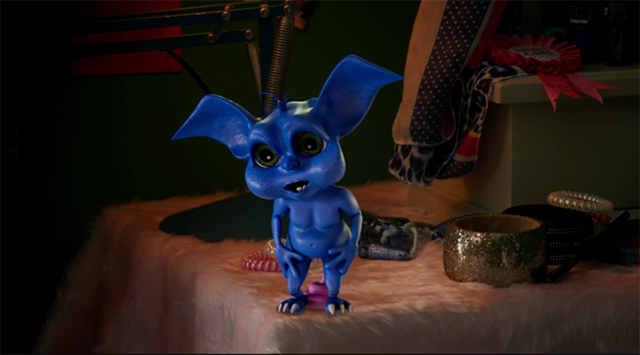From production delays to new guidelines and restrictions, the COVID-19 era has been a strange time to make TV.
For Directors UK members Aurora Fearnley and Benedict Cohen, it was also the environment that saw them gain their first broadcast credit, directing episodes of BBC Three’s The Break.
Aurora and Benedict spoke to us about how they get involved with the programme, moving from independent film to a new environment, and somehow making it all happen under Covid. Read their stories below.
How did you first get involved with The Break?
Aurora Fearnley: I saw the call out for season five of The Break in the Directors UK newsletter. The Break is a collaboration between BBC Writers Room, BBC Studios and BBC Three to introduce new voices. This season they wanted to focus on talent that identified with having a disability, something I’d started to publicly open up about since working with 104 Films in Sheffield a few years earlier.
On reading all five scripts for the series I found personal connections within most of the short eight page monologues, each talking about a different experience around having a disability in youth. Every script was moving, humorous and truly authentic.
Benedict Cohen: I got the job in a slightly roundabout manner. I am on the DANC (Disabled Artists Networking Community) mailing list and saw that BBC studios was casting for disabled talent for short films. I got in touch with the casting director to ask whether they needed a director. Much to my astonishment, they actually put me in touch with the producer and, after pitching, I got hired.
This series of The Break is all about disability. It features disabled talent in key positions behind and in front of the camera. Something that hopefully will become more normalised with each project like this that gets made.

How was pre-production, and how did working on The Break differ from what you’ve done before?
Aurora Fearnley: The online Zoom pitch was my first insight into working on a project that crosses multiple companies, and therefore would have multiple execs. It took me a while to understand everyone’s role and responsibilities as that wasn’t initially clear.
Ten days after pitching we were in prep. I was thrilled to be selected to direct two episodes, Rude and Losing It. The shoot dates were three weeks away in late October. Due to Covid the initial recces were filmed on WhatsApp for safety until there was a shortlist, meanwhile meeting the full team, doing castings and call backs were all done on Zoom.
On my previous seven independent shorts I’d always had priority choices for crew, but on The Break the crew was selected by the show’s producer, Esther Springer and line producer Francis Gilson. However, I was able to suggested and select my editors and the crew was excellent. Hearing we had Tony Miller as our DoP for the show was a boost, knowing he’d just come from Fleabag’s epic Emmy wins and was a master of fourth wall dialogue.
Benedict Cohen: I was incredibly impressed by the level of talent who auditioned. Kitty Castledine’s stellar performance carries the film. Sharing the same disability as the role meant she could bring so much depth, nuance and detail to her part. Still, acting directly to camera, Fleabag style, for 6 minutes, is no easy task. But she nailed it! She only started drama school a few weeks before filming. But apparently they teach the ‘Phoebe Waller Bridge’ from day one these days. I can’t wait to see what she does next.
This was my first time directing anything for a major broadcaster. Previously, I’d written and directed short films, some of them funded some of them not, and directed commercials and music videos.
Working with a large institution was a new experience for me. There were several elements at play. The project was initiated by BBC Writersroom, produced by BBC studios and commissioned by BBC Three. Luckily, I had a wonderful producer, Esther Springer, who helped look after and guide myself and the other first-time directors working on the series. We all had the sense that she had our backs and really cared deeply about each of the films.

What was the shoot like, what challenges presented themselves and how did you overcome them?
Benedict Cohen: When it came to production, we had the remarkable good fortune to collaborate with Tony Miller BSC, the cinematographer behind series 1 and 2 of Fleabag and several episodes of Carnival Row. It was an amazing opportunity to work with, and learn from, someone so experienced. Personally, he encouraged me to loosen up, stray from the storyboard and respond to the blocking as it emerged on set.
My short featured a CGI goblin, called Turnip. I wanted a cute, cheeky and retro-kitsch critter, that looked like he’d stepped out of a PS1 game. Creating Turnip began with Amy Foster’s lovely storyboards. Then Sai Aya fabricated the cheeky little purple critter in the film. And his poo…which obviously required a number of in-depth discussions and meetings about exactly what colour it should be — pink. Chad Raymond then created the creature’s characterful grunts and gurgles. Although I did end up providing Turnip’s sounds on the day for Kitty to react to. Embarrassingly, I had to shout them across the socially distanced set from behind the director’s monitor. Although rumour has it some of my caterwauling did actually make it into the final sound mix...

Aurora Fearnley: Locations were tricky. Covid aside I had one eight-page script with four locations that included flashback sequences spanning three/four different evenings in pubs and clubs with costume changes. Up to this point I was concerned about the one day shoot time, but luckily this season we had two per script. Access requirements and extra time allowances had been factored into all the shoots for the talent and crew.
Covid compliance was incorporated into the location recces and although the pieces were largely monologues to camera, we also had to consider supporting artists, and how to create a nightclub or freshers week vibe with a handful of people in safe covid bubbles.
For Rude we could only safely have two people in the toilet cubicles, which were host to 70% of the dialogue. This meant only Tony (DoP) and Niamh Longford, our lead actress, could be in there, so microphones were hidden in her hair and around the room. For me to give Niamh notes, either Tony would have to come out with steadicam attached or Niamh would have to leave.
We’ve all experience how great film crews are at adapting, and even with challenging rules for covid, everyone was quick and always respectful. We had to be prepared that things would just take longer, but in many ways the lack of crew crammed into the toilet made the space more realistic and free for the young actor.
Losing It had different challenges. For the lead, Nicholas Jacobson, his character would be semi-nude for entire monologue. Not only would this be his first TV role but also his first kissing scene, intimate sexual scene and his disability being exhibited publicly. Making the actor feel safe enough to bring his vulnerability to the shoot day was my main focus. As I was enrolled to take intimacy co-ordinations classes that year, I’d already absorbed some great tips on how to communicate and lead the actors for exactly this type of work, so with this shoot I put those principles into practice.

What experiences did you take away from The Break?
Ben Cohen: All in all, a wonderful experience. Fingers crossed I’m able to find an agent and/or my next gig off the back of it!
Aurora Fearnley: The number of roles and responsibilities, and the complexity of the production hierarchies, was on a different level to previous projects I’ve worked on. Fortunately, the year before I was mentored by Jon East while he shot Netflix’s new high-end fantasy show Cursed. Figuring out the hierarchy of a TV show was one of the biggest lesson I took away from the Director’s UK Inspire scheme. I found being on-set held a familiarity that I was comfortable with, but by being a fly on the wall in three hour VFX breakdown meetings and likewise script conversations with producers and execs — that’s where I learnt the politics of directing commercial TV. This experience stood me in good stead for navigating the different relationships working on The Break. As always prep is the key for each project, even when that prep happened six months previously, and on an entirely different shoot.
What have you been up to since The Break, and how can people find out more about your work?
Ben Cohen: I am looking for a producer for a feature screenplay I’ve written about a group of disability claimants who pull off a heist. You can visit my website here, and follow me on Instagram and Letterboxd.
Aurora Fearnley: I'm developing Tipping Point, an ecological sci-fi thriller with Jude Goldrei at Luna Lander films with BFI emerging development money. I also have folk horror Speak Its Name in development with producer Neil Chordia. You can find me on my web page or on Instagram.






Have Your Say
Join the discussion on Facebook